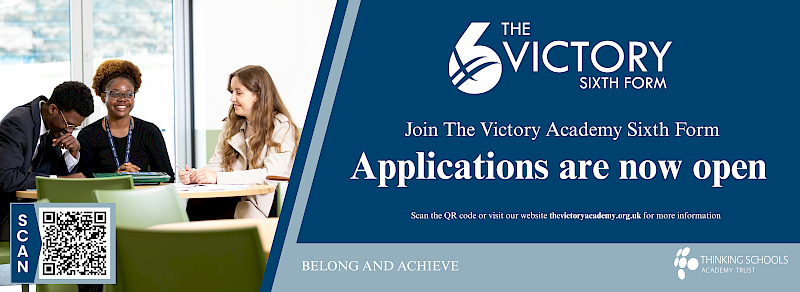
Applications for The Victory Academy Sixth Form are now open! To apply please click here.

Applications for The Victory Academy Sixth Form are now open! To apply please click here.
The intent of ICT & Computer Science is to provide a skills-based curriculum that will equip our students with skills to us IT in the real world, to develop computational thinking and to develop their creativity.
We have designed our key stage 3 curriculum to provide students with challenges and new experience in computing, digital literacy and digital media, regardless of their prior knowledge of using computers. We also develop skills in Microsoft Office, MS Teams and collaborative working, this supports student’s ability to access all areas of the wider curriculum throughout their school life and beyond.

Here at The Victory Academy in Key Stage 3, IT students cover a range of Creative IT and Computer Science topics. The programme of study we follow is structured in a way that involves research, design, planning, prototyping and testing for most of the creative elements and computational thinking to solve problems for Computer Science.
Students in Year 7 will begin their Key Stage 3 computing journey by looking the basic principles of how to use computers safely, efficiently and responsibly. This forms the basic understanding for their Computer Science and Information Technology education here at The Victory Academy, and it is something we highly value. Students will then go on to explore how we live in a networked society, before then exploring how different types of media are used to help gain support for a cause, using this as an opportunity to explore key concepts such as formatting a Word document effectively and legal issues attached to the use of media in a variety of contexts. Students will then be taught essential and transferable skills in the effective use of Spreadsheet software, before completing the year with their first programming opportunity of their time at The Victory Academy, using Scratch as a platform they will be used to learn basic programming.
Term 1 | Term 2 | Term 3 | Term 4 | Term 5 | Term 6 |
|---|---|---|---|---|---|
| Getting Started (introduction & ICT skills) | Spreadsheet | History of Computers | Scratch/Lapp | Computing Components | Python Introduction - Turning Lab |
In Year 8, students are introduced to more advance topics ranging from cybersecurity, ethics, and creating digital graphics in Inkscape. In cybersecurity they will explore various threats that users face in a modern society. During computational thinking, students will be taught the necessary problem-solving skills to help them solve computing-based problems later on in KS3. Their first opportunity to do so will be through the topic on Mobile App development. Students will also have an opportunity to exercise their creativity through this unit, as they will be given a chance to use their design skills to create a suitable product. Following on from this, students will then be given their next programming opportunity through an introduction to a text-based language. Students will complete the year by building on the programming.
In Year 9, students develop on the knowledge they have gained from both Year 7 and 8. Additionally, students explore user interface design and web design, equipping them with the skills to create functional and aesthetically pleasing digital content. This stage promotes British values, such as individual liberty and mutual respect, by encouraging responsible and ethical use of technology.
In KS4 students will follow the Digital Information Technology pathway. The course develops skills such as project planning, designing and creating user interfaces, and creating dashboards to present and interpret data. The processes underpin effective ways of working, such as project planning, the iterative design process, cyber security, virtual teams and legal and ethical codes of conduct.
Component 1 Exam board set assignment | Component 2 Exam board set assignment | Component 3 Scenario based external written examination |
|---|---|---|
Students will learn to:
| Students will learn how to:
| Students will learn about:
|
This course will deliver a variety of fundamental skills across the whole range of learning styles and abilities, effectively engaging and inspiring all students to achieve great things. Any job requires IT skills but some of the top trending jobs in Information Technology right now are IT consultants, Cloud Architects, Health IT Specialist, Web Developers, Software Engineers, Geospatial Professionals and Data Modellers. Many students who have chosen this pathway have gone onto university.